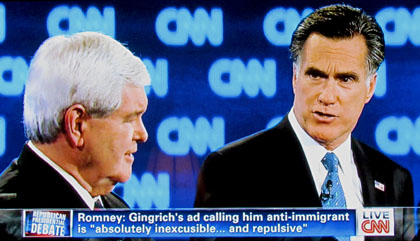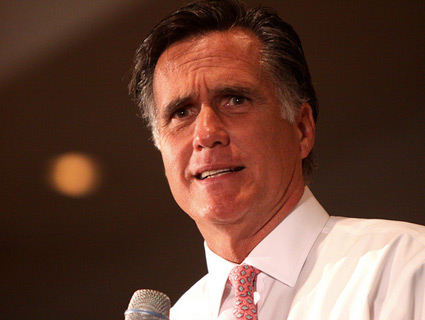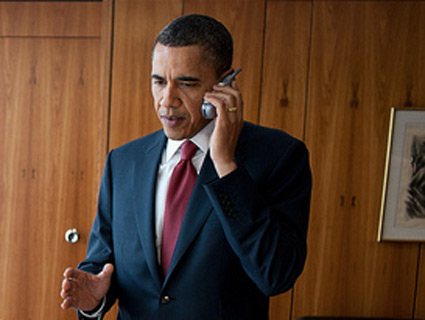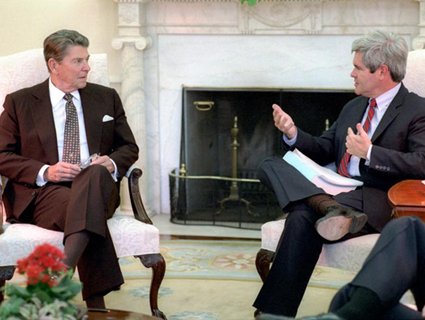 Jason Moore/ZUMA; James Colburn/ZUMA
Jason Moore/ZUMA; James Colburn/ZUMA
Mitt Romney and Newt Gingrich faced off on Thursday night in a final Florida debate before Tuesday’s primary. Read on for Kevin Drum’s roundup and more of best blog reactions to Thursday night’s CNN debate, or jump down to the top tweets of the night from MoJo’s news team and our other favorite tweeting political junkies. For more, also follow reporter @adamweinstein, who was on the scene in Jacksonville; Washington bureau chief @davidcorndc; and the rest of our DC bureau in the mix below.
Jacksonville Debate Roundup
You know those basketball rematches where a team that got pummeled last time suddenly comes out totally on fire and wins by a mile? It’s never clear quite why that happens, but it happened in the Republican debate tonight. I don’t know what Romney ate for breakfast this morning, but he came alive and wiped the floor with Newt Gingrich in this debate. He went after Gingrich for his Freddie Mac connections and made it stick. He was outraged when Newt said he was anti-immigrant, and for once he actually sounded outraged. And when Newt tried to buy some anti-media cred by attacking Wolf Blitzer, he got pwned by both Blitzer and Romney:

BLITZER: Earlier this week, you said Governor Romney, after he released his taxes, you said that you were satisfied with the level of transparency of his personal finances when it comes to this. And I just want to reiterate and ask you, are you satisfied right now with the level of transparency as far as his personal finances?
GINGRICH: Wolf, you and I have a great relationship, it goes back a long way. I’m with him. This is a nonsense question. Look, how about if the four of us agree for the rest of the evening, we’ll actually talk about issues that relate to governing America?
BLITZER: But, Mr. Speaker, you made an issue of this, this week, when you said that, “He lives in a world of Swiss bank and Cayman Island bank accounts.” I didn’t say that. You did.
GINGRICH: I did. And I’m perfectly happy to say that on an interview on some TV show. But this is a national debate, where you have a chance to get the four of us to talk about a whole range of issues.
….ROMNEY: Wouldn’t it be nice if people didn’t make accusations somewhere else that they weren’t willing to defend here?
Ouch. Gingrich has tried that bit about nasty attacks being OK when you’re on some radio show or something but not when you’re on national TV, and for some reason he’s gotten away with it even though it’s transparently self-serving and ridiculous. Tonight he didn’t.
This was all in the first half hour, but by then the debate was over. Romney lost a bit of his mojo later on and reverted to the stuttering, stumbling Mitt that we’ve seen in the last two debates, but not enough to hurt him, especially after Newt was forced to endure ten minutes of attacks over his support for a lunar colony during the second hour. This attack from Romney was both brutal and effective:
ROMNEY: I spent 25 years in business. If I had a business executive come to me and say they wanted to spend a few hundred billion dollars to put a colony on the moon, I’d say, “You’re fired.”
The idea that corporate America wants to go off to the moon and build a colony there, it may be a big idea, but it’s not a good idea. And we have seen in politics — we’ve seen politicians — and Newt, you’ve been part of this — go from state to state and promise exactly what that state wants to hear. The Speaker comes here to Florida, wants to spend untold amount of money having a colony on the moon. I know it’s very exciting on the Space Coast.
In South Carolina, it was a new interstate highway, and dredging the port in Charleston. In New Hampshire, it was burying a power line coming in from Canada and building a new VHA hospital in New Hampshire so that people don’t have to go to Boston.
Look, this idea of going state to state and promising what people want to hear, promising billions, hundreds of billions of dollars to make people happy, that’s what got us into the trouble we’re in now. We’ve got to say no to this kind of spending.
Coming from a guy like Romney who’s famous for his willingness to say pretty much anything to anybody, this was a great job of jiu jitsu. It was also true. Gingrich really has been pandering to state interests relentlessly, and nowhere more so than in Florida.
I don’t know how much debates really matter compared to the tidal wave of advertising that’s inundating Florida right now, but if they do matter then Romney won the Florida primary tonight, and almost certainly the nomination along with it.
Mitt Romney Misleads on His Fannie and Freddie Investments
 scurzuzu/Flickr
scurzuzu/Flickr
Challenged on his investments in the government sponsored housing enterprises Fannie Mae and Freddie Mac at Thursday’s GOP presidential debate, Mitt Romney offered a seemingly bulletproof defense: He shouldn’t be responsible for those investments, because he’d put his money in a blind trust. In other words, he had no idea which companies he was involved with. As he explained, “My investments for the last 10 years have been in a blind trust, managed by a trustee. Secondly, the investments they’ve made—we’ve learned about this as we made our financial disclosure—have been made in mutual funds and bonds. I don’t own stock in either Fannie Mae or Freddie Mac. There are bonds the investor has held through mutual funds.”
It was a good comeback, and when Romney countered by pointing out that Newt Gingrich had himself invested in Fannie and Freddie, the former House speaker appeared to concede the point. But there’s a problem: As the Boston Globe reported [1], Romney’s investments in Fannie and Freddie weren’t part of a blind trust:
On his financial disclosure statement filed last month, Romney reported owning between $250,001 and $500,000 in a mutual fund that invests in debt notes of Fannie Mae, Freddie Mac, among other government entities. Over the previous year, he had reported earning between $15,001 and $50,000 in interest from those investments.
And unlike most of Romney’s financial holdings, which are held in a blind trust that is overseen by a trustee and not known to Romney, this particular investment was among those that would have been known to Romney.
The investment was also not on Romney’s 2007 financial disclosure form. A Romney aide said the investments were made in the latter half of 2007, after he had filed the earlier disclosure form. That was around the time that the scale of the housing crisis was coming into focus.
Romney Inadvertently Defends Obamacare (Again)
 Gage Skidmore/Flickr
Gage Skidmore/Flickr
Republicans hate Obamacare. Mitt Romney can’t stop defending it.
Not directly of course. But in Thursday night’s debate, just as in the one last week, Romney was confronted over his implementation of health care reform in Massachusetts that served in part as the blueprint for the Affordable Care Act. When Rick Santorum accused the ex-governor of supporting a “top-down government-run health care system,” Romney calmly explained that under his plan, Massachusetts residents were still purchasing private insurance. When Santorum reminded Romney that his plan compelled individuals without health insurance to buy it on “condition of breathing,” Romney gave an eloquent, if conservative, defense of the individual mandate:
[F]or the 8 percent of people who didn’t have insurance, we said to them, if you can afford insurance, buy it yourself, any one of the plans out there, you can choose any plan. There’s no government plan. And if you don’t want to buy insurance, then you have to help pay for the cost of the state picking up your bill, because under federal law if someone doesn’t have insurance, then we have to care for them in the hospitals, give them free care. So we said, no more, no more free riders. We are insisting on personal responsibility. Either get the insurance or help pay for your care. And that was the conclusion that we reached.
All of this can be said about Obamacare. It doesn’t “take over” the health care system, it regulates a health insurance market in which private companies compete. Individuals are compelled to buy insurance because, if they don’t, taxpayers ends up paying for their health care once they get sick. Romney simply can’t explain why Romneycare isn’t socialism without also explaining why Obamacare isn’t socialism. He can’t defend Romneycare’s individual mandate as an issue of personal responsibility without also doing the same with the individual mandate in the Affordable Care Act.
The strange part wasn’t that Romney offered this defense—after all, he’s done it before. It’s that when he offered it, the Republican audience actually applauded (via BuzzFeed).
Now, the Affordable Care Act is anathema to the Republican base. Every Republican candidate for president has vowed to repeal it. Yet framed in conservative terms, and defended by the likely Republican nominee, a Republican audience applauded its key concepts. Not every Republican loved Romney’s health care plan when it was implemented, but the perception of the Affordable Care Act as the twilight of freedom in America is largely a function of partisanship rather than ideology.
The mandate may not survive the Supreme Court. A recent Kaiser Family Foundation poll found that more than half of Americans think the mandate is unconstitutional, and the court is not immune to public sentiment. Partisanship is a powerful force, one that not only gives the Supreme Court popular cover for repealing the Affordable Care Act by fiat, but also will likely lead to the Republicans nominating Obamacare’s most eloquent defender.
GOP Candidates: Obama Keeps Snubbing Israel!
 The White House/Flickr
The White House/Flickr
Late into Thursday night’s Republican presidential debate at the University of North Florida in Jacksonville, the conversation inevitably turned to the Israeli-Palestinian conflict. Occasional front-runner Mitt Romney took that as his cue to talk as little about the peace process as possible and play up President Barack Obama’s supposed foreign policy weakness as much as possible.
“The Palestinians want to eliminate Israel,” Romney said, painting things with a really, really, really broad brush. He went on to criticize President Obama for supposedly having said “nothing” during his September speech at the United Nations “about thousands of rockets being rained in on Israel from the Gaza Strip.” Well, that is not true. (Romney also repeated his claim that the president has tossed Israel under the proverbial bus.)
Newt Gingrich wasn’t far behind in attacking Obama, insisting that the Washington response to Palestinian “acts of war” was yet another contemptible example of the current administration’s fecklessness abroad and at home. Here’s video from the debate:
Let’s get this out of the way quickly: Here’s the president— delivering that speech to the UN General Assembly that Romney was talking about—addressing all those rockets “from the Gaza Strip”:
America’s commitment to Israel’s security is unshakeable…[S]o we believe that any lasting peace must acknowledge the very real security concerns that Israel faces every single day. Let us be honest with ourselves: Israel is surrounded by neighbors that have waged repeated wars against it. Israel’s citizens have been killed by rockets fired at their houses and suicide bombs on their buses. Israel’s children come of age knowing that throughout the region, other children are taught to hate them. Israel, a small country of less than eight million people, look out at a world where leaders of much larger nations threaten to wipe it off of the map. The Jewish people carry the burden of centuries of exile and persecution, and fresh memories of knowing that six million people were killed simply because of who they are. Those are facts. They cannot be denied.
Now, check out then-Sen. Obama in July 2008, waxing personal about rockets being launched at Israeli civilians:
If somebody was sending rockets into my house where my two daughters sleep at night, I’m going to do everything in my power to stop that. I would expect Israelis to do the same thing.
There you have it: Barack Obama saying something about all those rockets.
Also, it should be fairly obvious by now that Barack Obama is not planning on defriending Israel. Despite talk of the “Jewish backlash” that supposedly resulted from Obama’s mention of 1967 borders last year, the Obama administration has been rock-steady on military aid and sales, played it super-safe on the Palestinian bid for statehood, and expressed Washington’s “ironclad” commitment to Israel’s security time and time again.
Furthermore, if Israelis are supposed to be living in fear of President Obama not caring about existential threats coming their way, then, according to plenty of recent polling, somebody forgot to tell the Israelis.
What Newt Gingrich Doesn’t Get About Deportation and Gangs Like MS-13
 An MS-13 gang member with the gang’s full name tattooed on his back. Federal Bureau of Investigation/Wikimedia Commons
An MS-13 gang member with the gang’s full name tattooed on his back. Federal Bureau of Investigation/Wikimedia Commons
At Thursday’s GOP presidential debate in Jacksonville, Newt Gingrich was asked early on about his position on illegal immigration. Although he defended his proposal that senior citizens and families who have been here for a long time should be allowed to stay, Gingrich took a harsh stand on everyone else. “Look, I think, first of all, we need to control the border, which—I would finish the border fence by 2014…We should also make deportation easier, so that when we deport people who shouldn’t be here, MS-13, for example, it should be very quick.”
MS-13, for the uninitiated, is a Central-American gang with a large presence in the United States. Newt has cited the group with regularity on the campaign trail. Conflating undocumented immigrants with violent criminal activity is hardly a new concept. But Newt’s MS-13 line is missing one key fact—mass deportations are the reason the gang has grown like it has in the United States. Well-intentioned American policies created a cycle by which gang members would return to El Salvador and recruit new members, who in turn travel to the United States themselves. The Los Angeles Times examined the issue in a great 2005 investigation. Here’s the thrust of it:
In the last 12 years, U.S. immigration authorities have logged more than 50,000 deportations of immigrants with criminal records to Central America, including untold numbers of gang members like Cruz-Mendoza.
But a deportation policy aimed in part at breaking up a Los Angeles street gang has backfired and helped spread it across Central America and back into other parts of the United States. Newly organized cells in El Salvador have returned to establish strongholds in metropolitan Washington, D.C., and other U.S. cities. Prisons in El Salvador have become nerve centers, authorities say, where deported leaders from Los Angeles communicate with gang cliques across the United States.
A gang that once numbered a few thousand and was involved in street violence and turf battles has morphed into an international network with as many as 50,000 members, the most hard-core engaging in extortion, immigrant smuggling and racketeering. In the last year, the federal government has brought racketeering cases against MS-13 members in Long Island, N.Y., and southern Maryland.
Top Tweets
Here are our favorite tweets from Thursday night’s GOP debate on CNN. The sections are in reverse-chronological order, with the end of the debate at the top.
Postgame reactions, starting with a sarcastic jibe at the moderators from our own Tim Murphy:
Thought the question on Sheldon Adelson was terrific.
— Tim Murphy (@timothypmurphy) January 27, 2012
Winner? Mitt Romney’s new debate coach.
— Dylan Byers (@DylanByers) January 27, 2012
Bottom line on tonight’s debate: Romney was superb, Gingrich was terrible… pwire.at/ywuUGI
— Taegan Goddard (@politicalwire) January 27, 2012
Romney: 91.3% chance of winning Florida on Intrade bit.ly/yVueDW #CNNDebate
— E.D. Kain (@erikkain) January 27, 2012
And we’re in the home stretch. Blitzer asks each of the candidates why he’s the one who is most qualified to beat Obama.
Only way Romney can lose this debate now is by saying he’s going to go out and eat tacos.
— Nate Silver (@fivethirtyeight) January 27, 2012
College. #CNNDebate twitter.com/AdamWeinstein/…
— Adam Weinstein (@AdamWeinstein) January 27, 2012
Santorum: “Global warming hoax.” Haven’t heard him say that before.
— Ben Smith (@BuzzFeedBen) January 27, 2012
Last question: given a choice would you build a monument to your wife or Ronald Regana on the moon?
— Ryan Lizza (@RyanLizza) January 27, 2012
#Gingrich gets in the Saul Alinsky line with 2 minutes to spare. #cnndebate
— Jim Roberts (@nytjim) January 27, 2012
The Israeli-Palestinian conflict:
Shorter Newt: I find it suspicious that Obama likes Arabs so much.
— AdamSerwer (@AdamSerwer) January 27, 2012
On Latin America:
Santorum on Latin America: “cancer,” “thuggery,” “Marxism,” “jihadists,” “terrorists,” “missile sites”…no, not #overheated at all, Rick.
— Mark Follman (@markfollman) January 27, 2012
Noriega? Isn’t he in a Florida JAIL? Santorum went back to the 80s in his mind. #CNNdebate
— David Corn (@DavidCornDC) January 27, 2012
Amazingly, there are more kinds of Latinos in Florida than just Cubans. I know, I know. #CNNDebate #MemoToTheGOP cc @daveweigel
— Adam Weinstein (@AdamWeinstein) January 27, 2012
Obama took a trade tour to Brazil, Chile and El Salvador a few months ago. Maybe Romney was too busy non-appeasing to notice. #CNNdebate
— David Corn (@DavidCornDC) January 27, 2012
Here’s what Newt Gingrich REALLY thought of Reagan, from what he said at the time: mojo.ly/A5zYQB
— NickBaumann (@NickBaumann) January 27, 2012
Newt: Romney’s right, “I am vastly closer to Reagan.”
— Gavin Aronsen (@garonsen) January 27, 2012
Yep, Wolf Blitzer even asked about the wives:
Newt should definitely point out that Callista’s hair will double as a Moon Helmet. #CNNDebate
— pourmecoffee (@pourmecoffee) January 27, 2012
My wife would make the best First Lady because it would imply that I am president.
— Kevin Drum (@kdrum) January 27, 2012
Healthcare time:
Fact: Romney can’t explain why Romneycare isn’t socialism without explaining why Obamacare isn’t socialism.
— AdamSerwer (@AdamSerwer) January 27, 2012
You don’t think Santorum thinks mandate is a gay thing, do you?
— Ryan Lizza (@RyanLizza) January 27, 2012
In 2007, Newt urged Congress to pass a law imposing a national individual mandate. It’s a fact. Really, it is. #CNNdebate
— David Corn (@DavidCornDC) January 27, 2012
Oooh, Santorum said “top-down medicine.” I was the only one in the #CNNdebate press room who chuckled. #Embarrassing
— Adam Weinstein (@AdamWeinstein) January 27, 2012
Santorum calls Romneycare a “top-down government run health care system.” #untrue
— AdamSerwer (@AdamSerwer) January 27, 2012
Aaaaaaand we’ve launched into space!
An 1892 LDS publication about the moon being inhabited: j.mp/xG2uvv #moon
— Joshua Green (@JoshuaGreen) January 27, 2012
Romney attack on Newt for pandering to state interests is very effective. And true.
— Kevin Drum (@kdrum) January 27, 2012
What if Freddie Mac underwrote moon mortgages. Then what, Newt? #CNNdebate
— David Corn (@DavidCornDC) January 27, 2012
At Space Town Hall, Gingrich dates himself, tells crowd he used to read ‘Missiles and Rockets’ magazine (in late 50s).
— Sarah Huisenga (@SarahH_CBSNJ) January 25, 2012
Romney replies: “I have been thinking about these issues since Town & Country were separate magazines.”
— Ryan Lizza (@RyanLizza) January 27, 2012
BTW, I’ve lived all over Florida all my life. I don’t know anyone for whom NASA is a voting issue. #CNNdebate
— Adam Weinstein (@AdamWeinstein) January 27, 2012
In reality NASA is mostly Boeing and Lockheed. Not a government agency. A contract.
— michaelscherer (@michaelscherer) January 27, 2012
Paul is going to say that moon colonies should be done by the states. #justguessing
— michaelscherer (@michaelscherer) January 27, 2012
Shorter Romney: Moon austerity! #cnndebate
— Suzy Khimm (@SuzyKhimm) January 27, 2012
On taxes and personal wealth:
Santorum: Leave that rich guy alone! Focus on the real issues! Like, say, “belief in god”? mojo.ly/yB2SLD #CNNdebate
— Mark Follman (@markfollman) January 27, 2012
On points, Romney probably winning.On soundbites that will be great in ads, Romney doing a fantastic job.#trustee
— Bill Burton (@billburton716) January 27, 2012
Santorum: “Mitt Romney is a wealthy guy because he worked hard.” A few loud sighs in #CNNdebate press room.
— Adam Weinstein (@AdamWeinstein) January 27, 2012
All you need to known about @MittRomney‘s Goldman’s investments: bit.ly/zCPvpl #cnndebate
— Andy Kroll (@AndrewKroll) January 27, 2012
Newt said, “right” when Mitt attacked him for owning Freddie Mac bonds? Not a great debate moment. #CNNdebate
— David Corn (@DavidCornDC) January 27, 2012
Mitt: “My investments are not made by me.” Sounds of a few clicking teeth in #CNNDebate press room.
— Adam Weinstein (@AdamWeinstein) January 27, 2012
Fannie and Freddie:
Mitt to Newt: Both of us profited from the housing crisis! #capitalism
— AdamSerwer (@AdamSerwer) January 27, 2012
Nothing says “let’s focus on the middle class” like Comparative Investment Smackdown.
— Max J. Rosenthal (@AbuZilif) January 27, 2012
Better Q for Mitt: do you think we should refinance mortgages through Fannie and Freddie, as your economic adviser suggests? #cnndebate
— Suzy Khimm (@SuzyKhimm) January 27, 2012
Romney very well prepped. Props to his new debate coach.
— Nate Silver (@fivethirtyeight) January 27, 2012
No no no: Fannie & Freddie did not trigger the housing crisis. Read this: bit.ly/c24eRB AND this: bit.ly/xQPrIn #cnnebate
— Andy Kroll (@AndrewKroll) January 27, 2012
FYI, Jacksonville is 55% white, 30% black, 8% Latino. This #CNNDebate crowd is not reflective of NORTH Florida demographics.
— Adam Weinstein (@AdamWeinstein) January 27, 2012
The Ron Paul sideshow:
It happened again. Paul started talking, and the press room at #CNNDebate fell. completely. silent. #WTF
— Adam Weinstein (@AdamWeinstein) January 27, 2012
Dammit, it happened again. What black magic does Ron Paul have over the #CNNdebate press corps? #Silence
— Adam Weinstein (@AdamWeinstein) January 27, 2012
Immigration (and “self-deportation“):
Always a win with a GOP audience: A White dude taking umbrage at the idea that they could be racist.
— AdamSerwer (@AdamSerwer) January 27, 2012
I’m for self-incarceration for criminals. #cnndebate
— David Corn (@DavidCornDC) January 27, 2012
LOVE Mitt’s feigned ignorance at the language of the ghetto quote. Pulled the same thing on Cain and 9-9-9.
— Tim Murphy (@timothypmurphy) January 27, 2012
Magazine reporters behind me discussing the “fine line” of Mitt’s mentioning his Mexico-born dad. #CNNDebate
— Adam Weinstein (@AdamWeinstein) January 27, 2012
Everytime Newt and Mitt ref’d “Self-Deportation,” 3 smartphones dinged messages around me in the #CNNDebate press room.
— Adam Weinstein (@AdamWeinstein) January 27, 2012
Romney’s “coyotay” = Obama’s “Paaahkistan.” #streetcred #CNNdebate
— Suzy Khimm (@SuzyKhimm) January 27, 2012
Weird that playing the “think of the grandparents” card is stronger than the “think of the children” card.
— Tim Murphy (@timothypmurphy) January 27, 2012
As Santorum answers immigration Q, Florida dailies’ reporters type furiously. National media, less so. #CNNDebate
— Adam Weinstein (@AdamWeinstein) January 27, 2012
Reminder: both libertarians and lefty civil liberties folks are squeamish about national ID cards, per Romney. #cnndebate
— Suzy Khimm (@SuzyKhimm) January 27, 2012
Putting credit card companies in charge of immigration would mean people have to leave the country and then go 20% further every month.
— Ana Marie Cox (@anamariecox) January 27, 2012
And we’re off!
During commercial break, “tiny mouse/hug elephant” was topic of convo in #CNNDebate press toom.
— Adam Weinstein (@AdamWeinstein) January 27, 2012
As #CNNDebate starts, 200 reporters lean into their computer screens as if they’re @JimmyRollins11 looking a pitch in.
— Adam Weinstein (@AdamWeinstein) January 27, 2012
Yes, this is probably the most important GOP debate. It’s not a cliche for once.
— Nate Silver (@fivethirtyeight) January 27, 2012
John King says he wants loud audience participation
— Rachel Weiner (@FixRachel) January 27, 2012
The pre-game:
In the #FLDebate media room. They put @MotherJones next to @WeeklyStandard. Let’s get ready to rummmmmble
— Adam Weinstein (@AdamWeinstein) January 27, 2012
“The entire future of our planet and our species–and even the galaxy–depends on the next 90 minutes.” #PossibleNewtOpeners
— David Corn (@DavidCornDC) January 27, 2012
Wolf Blitzer moderating tonight’s debate. He is known to FL’s large Hispanic population as “El Lobo” or “El Idiota.”
— pourmecoffee (@pourmecoffee) January 27, 2012









